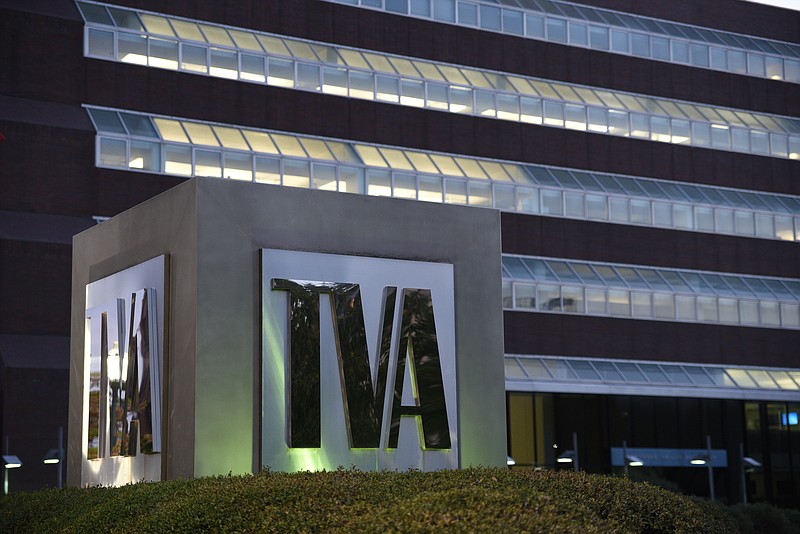As colder weather approaches, the source of heat for most Chattanoogans will be a bit cheaper next month than it was a year ago.
The price of electricity in Chattanooga will dip slightly in December to keep EPB's power rates 2.4 percent below where they were a year ago. Although December total power bills are likely to rise above this month's bill as temperatures get colder with the arrival of winter and home and businesses consume more power to stay warm, the price of that power will be lower next month and the cheapest rate for December in at least five years.
The Tennessee Valley Authority adjusts its monthly power rates, in part, based upon the average cost of the fuel it uses to generate electricity and the federal utility is lowering its December fuel adjustment portion of consumer bills by 3.2 percent in December from the current rate. The December fuel portion of bills will be down 17.4 percent from a year ago.
Although the cheaper fuel is being offset by higher base rate charges adopted by TVA for the fiscal year that began Oct. 1, overall electricity rates are still down.
"This will be the lowest December (for TVA rates) since at least 2013, which we began our current calculations for fuel cost adjustments," TVA spokesman Scott Brooks said. "The overall system average fuel rate for December is approximately 10 percent lower than the three-year average December fuel cost. This is mainly due to lower purchased power rates and higher expectations for hydro generation."
Power costs drop
With a drop in the monthly fuel cost adjustment, EPB’s price for the typical residential customer who uses 1,295 kilowatt hours of electricity in a month will drop in December*$139.90 - December, 2017 bill* $139.91 - November, 2017 bill* $143.34 - December, 2016 billSource: EPB based upon residential customer charges for 1,295 kilowatt hours used in a month
TVA's fuel is cheaper because the federal utility is generating more of its power this year from its hydroelectric dams, which have been "fueled" by heavier rains from Mother Nature during 2017, and from nuclear power, including the new Watts Bar Unit 2. Although nuclear power plants are more expensive to build than any other power generation, their fuel costs are far below that of coal or natural gas plants.
TVA also improved its relative price of power compared with other utilities because of its shift to a more balanced generation mix between nuclear, coal, natural gas, hydro and renewable sources such as wind and solar. TVA's delivered rates to the 155 municipalities and power cooperatives that buy its power in the 7-state Tennessee Valley is cheaper than it was in 2012 and has declined more than most of its neighboring utilities, largely due to cheaper fuel costs from nuclear and hydro and TVA's cost-cutting programs which have cut nearly $800 million from the utility's annual operating and maintenance expenses.
"Our delivered cost is 2 percent cheaper than it was five years ago and I'm hoping we can continue that through our debt reduction period (through 2020)," TVA President Bill Johnson told the Times Free Press last week. "But if we do have any increases, I think they will be very small."
The drop in power rates next month is unusual for December when higher demand usually requires TVA to turn to more expensive forms of power generation and comes despite a jump in natural gas prices in the past year. Although natural gas prices fell by nearly a half from the start of 2014 to 2016, they jumped by nearly a third in the past year.
TVA also increased its wholesale base rates by nearly 2 percent in each of the past three fiscal years and EPB also had a rate increase it is power prices in 2015.
But those base rate increases have been more than offset by cheaper fuel charges because of TVA's greater reliance upon nuclear and hydro and by fuel hedging contracts that help even out the price of fuels for TVA.
For a typical Chattanooga homeowner who uses 1,295 kilowatt hours of electricity a month, the average December power bill will be $139.90 - a penny cheaper from the price of the same amount of power in the previous month and $4.44 less than the price for that power a year earlier.
Johnson said TVA's goal is to avoid any major power rate increases for the foreseeable future.
"Our objective is to keep rates stable, or even bring them down on a total effective basis," he said. "That obviously gets harder every year because we have already taken so much costs down and the cost reductions we can make (in operating and maintenance expenses) are so much smaller."
In addition to cutting its operating costs, TVA is reducing its capital spending after finishing last year what the utility envisions as its last new major base load power addition in at least a decade. TVA spent more than $5 billion to finish and startup the Unit 2 reactor at the Watts Bar Nuclear Plant in October 2017, but TVA is not planning any additional major new generation projects of its own in the foreseeable future as electricity demand in TVA's 7-state region is forecast to be flat, or perhaps even down slightly, over the next decade.
TVA is on target to reach its goal to reduce its total debt and long-term obligations to $21.8 billion by 2023.
Contact Dave Flessner at dflessner@timesfreepress.com or at 423-757-6340.
